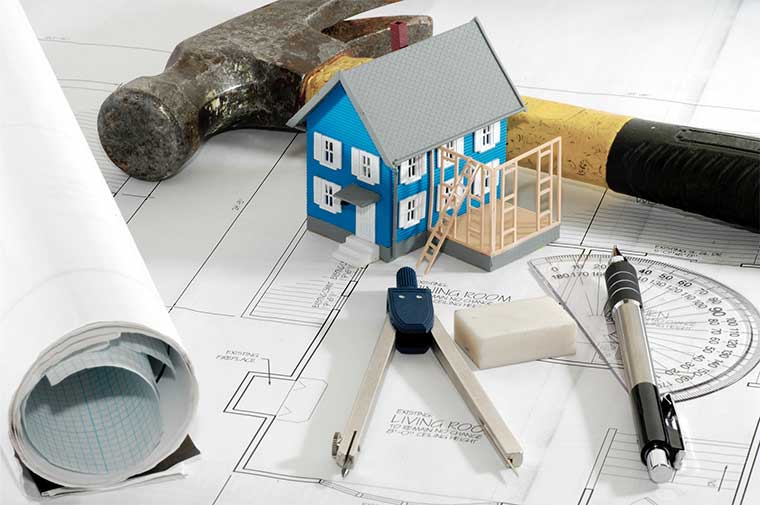Last week we talked about Choosing the Right Remodeling Contractor for Your Project featuring Silent Rivers General Manager Marc Black. Now we address some of the best options for financing those projects.

Once you’ve identified how you will achieve your remodeling dreams, the next step is to decide how you will pay for it. We asked two area financial professionals for their expertise on some options for financing home remodeling projects. Our experts are Ralph DiCesare and Brian Klaas, both from Northwest Bank in West Des Moines.
1. What are some of the options for homeowners to pay for their home remodeling or renovation projects? And what are the pros and cons to each of these options?

Brian Klaas, Mortgage Banker, Northwest Bank
Brian serves on the Residential Lending Committee for Northwest Financial Corporation and is a member of the Des Moines Business Group.

Ralph DiCesare, VP Commercial Banker, Northwest Bank
Ralph is a member of the Homebuilders Association of Greater Des Moines and school board member for the Martensdale-St. Marys Community School District.
Cash
We can all probably agree, “cash is king.” Paying cash, or a partial cash payment, will keep the overall loan-to-value of your home lower. And less loan interest is paid over time.
However, if you are paying cash, you will be using savings and depleting your cash reserves. If you deplete too much of those reserves, and issues arise with the project or other emergencies occur, you may end up taking out a loan to cover those issues. Unless you have more than enough cash available, it is wise to have a backup option.
Home Improvement Loans
A conventional construction loan allows you to build or remodel your home while utilizing an appraised value based on the “after-improved” value of the home. Since each construction/remodel loan is unique, there may be different loan-to value limits.
A Section 203(k) loan is an option if you purchase a fixer-upper; you can receive a single, long-term, fixed or adjustable rate loan for the acquisition and the rehabilitation of the property. You must go through an FHA-approved lending institution for this loan.
We recommend that you speak with your bank about these conventional and FHA fixer-upper loans and compare them to determine what loan will be the best fit for your needs.
Home Equity Line of Credit
A home equity line of credit (HELOC) is a line of credit for homeowners using your home as collateral. A maximum loan amount is established and then you may draw upon the line of credit as needed. In most cases, you can get financing for up to 90% of the value of your home.
This is a revolving loan, meaning that you can borrow against the equity and pay it down multiple times over the life of the loan.
The HELOC interest rate is based on a predetermined variable rate, typically based on a prevailing prime rate. You will only pay interest on what you have advanced on the line of credit. The term of a HELOC can last anywhere from less than five years to more than 20 years. Another potential benefit: your interest payment could be tax deductible. Check with your CPA on this.
Home Equity Loan (or Second Mortgage)
Similar to the HELOC (described above), a home equity loan allows you to borrow against the equity in your home. However, this is a fixed rate loan with fixed principal and interest payments based on the agreed-to terms between you and your lender.
The amount of the loan is based on the difference between the homeowner’s equity and the home’s current market value. Like a HELOC, home equity loan interest payments may be tax deductible and in most cases you can get financing up to 90% of the value of your home.
Both a home equity line of credit (HELOC) and a home equity loan require a lien to be placed against the home, in a second lien position behind your first mortgage, so it is sometimes referred to as a second mortgage. A home equity loan is a non-revolving loan, meaning the loan amount is set at a specific amount and cannot be changed throughout the life of the loan.
Cash-Out Refinancing
This is a mortgage refinancing transaction and an alternative to a home equity loan. It’s a popular way for borrowers to access the equity of the home to pay down debt or make additional purchases. In a cash-out refinance, the refinanced mortgage amount is greater than the existing mortgage amount. Closing costs are rolled into the amount of the loan.
A cash-out refinancing loan is a single 30-year fixed-rate loan which results in lower overall payments compared to a home equity loan which entails having a first and second mortgage loans with two separate payments. With a cash-out refinancing loan, you may also end up with a lower interest rate than your current first mortgage.
When considering cash-out refinancing, you need to make a risk-based assessment of whether extracting equity from your home is economical. This is a first mortgage refinance and you may end up with a higher interest rate than your current mortgage. Also there is a maximum 80% loan-to-value of the home as completed (after the remodel).
Neighborhood Finance Corporation
The Neighborhood Finance Corporation (NFC) is a not-for-profit mortgage bank in Des Moines that offers mortgage loans to qualified applicants. NFC provides unique lending programs and other services to facilitate targeted neighborhood revitalization in Polk County, Iowa through partnerships with residents, governments, community-based organizations and the business community. NFC offers purchase loans, refinancing loans and home improvement loans with fixed rates.
This is a good option for homeowners within one of NFC’s targeted areas. NFC has in-house underwriting and individual loan officers. Contact NFC directly for more information.
2. What steps need to be taken to work through the financing process?
The first step with any loan is to reach out to a banker to discuss and define your loan needs. You and your banker will talk through the different financing options that will best meet your needs and that will ultimately help you finance your remodeling project.
Once a best-fit loan program has been established, your banker will provide you with the specific information needed for a final loan approval along with a timeline so that everyone is working toward a common project completion date and the loan end-date.
3. Do homeowners need an appraisal to acquire financing?
In most cases, the answer is yes. However, if you are considering one of the home equity options and there is currently enough equity in your home to make the improvements, then an appraisal might not be necessary.
4. Can an appraised value be determined based on the future improvements? If so, how?
Yes. You or your builder just needs to supply plans, specifications and a project cost sheet to the bank. The bank then includes this information in the appraisal request to do the appraisal “as completed.”
5. Is there a standard loan-to-value ratio to consider or does it depend on the type of loan?
It does depend on the type of loan program. It’s best to discuss with your banker your needs to determine the best-fit loan for you. A typical loan-to-value ratio for home equity loans can be as high as 90%.
6. What can a homeowner or contractor do to be proactive in the financing process?
- Be realistic with your budget and stick to it.
- Anticipate any issues that could increase costs and make sure to include them early in the process.
- Gather all the information listed under #2 above and go see Brian at Northwest Bank to get pre-approved. ☺
7. How can I determine what the return on my remodeling investment might be when it comes time to sell?
We typically refer customers to their realtor if they have one, or to a realtor we work with, to obtain a market analysis based on the after-improved value of the home. Given that all remodeling projects are unique, and all neighborhoods are unique, a market analysis by a real estate professional should provide the best return on investment for the remodeling project.
Read more about cost-vs-value of remodeling in the Des Moines area
8. Are there tax credits available for my project?
See the Iowa Dept of Revenue Property Tax Credits and the Database of State Incentives for Renewables & Efficiency.
Are you ready to achieve your remodeling dreams? Contact Silent Rivers to discuss your home remodeling project!